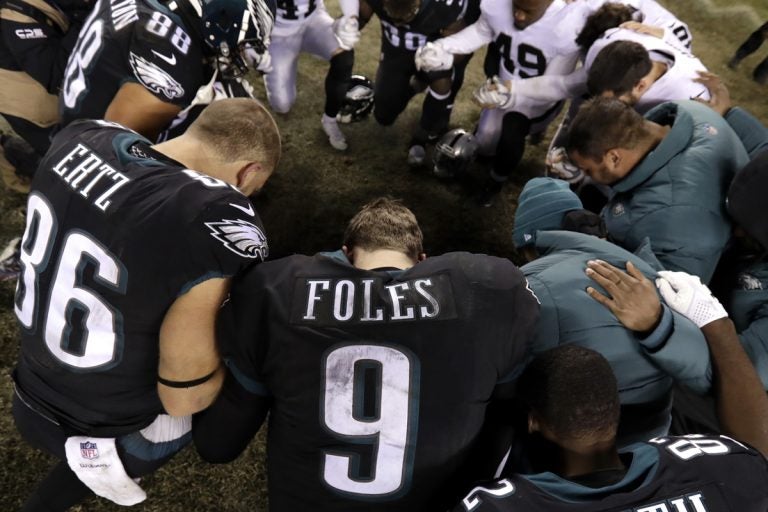What’s the harm in ‘bleeding green’?
Eagles fans are known for their passion and commitment to the team — which often comes with high stress levels. But is it really good for our health to be so invested?

Philadelphia Eagles' Nick Foles (9) kneels with other players after an NFL football game against the Oakland Raiders, Monday, Dec. 25, 2017, in Philadelphia. Philadelphia won 19-10. (AP Photo/Michael Perez)
It is broadly recognized that Eagles fans are some of the most passionate fans in the nation. Evidence suggests our strong identification with the Birds can boost positive mood, self-worth, and a sense of connection to others. It doesn’t come without a cost though. The idea of “bleeding green” may best describe what happens to us emotionally and physically during times of intense Eagles-induced stress.
As a diehard fan flies to Icarus-like heights and dips to despairing depths during a 60-minute game, the heart follows — literally. When studying ER activity during the World Cup in Germany, for instance, researchers found that fans were twice as likely to have a heart attack and three times as likely to experience cardiac arrhythmia on days when the German team played.
Increases in cortisol, a hormone connected to the “fight or flight” response, also accompany empathic stress that comes from watching games. Additionally, seeing a game’s outcome as unfair can lead to feelings of aggression. All this is not to sway anyone’s opinion about professional football but, rather, to show just how real the impact of watching it can be.
Employers might want to pay close attention on Sundays as well, as the effects of negative outcomes in games can spill over into the next day.
Researchers have found that team disappointments drained Monday job enthusiasm and reduced work effectiveness. One would be surprised if the loss of a franchise quarterback in a Super Bowl-bound year doesn’t multiply these effects, especially if one allows disappointment to do the math.
One way we naturally cope with intense disappointment is by lowering expectations, so we become less susceptible to the emotional impact of something bad happening again. Events such as the Eagles achieving a 9-3 record during the first 12 weeks of 2014, only to miss the playoffs, is a good example of why we might readily crawl into a low-expectation shell in subsequent years. Waiting for the other shoe to drop may not be irrational pessimism built on the belief that our city is cursed, but rather a way we can avoid the trauma of another letdown.
Turning on sports talk radio reveals another common coping strategy, one highlighted by a classic experiment by Stanley Schachter in the late 1950s. People who expected shocks to be particularly painful preferred to be with others who would also be shocked. As Schachter saw it, “misery loves miserable company.” Binding our rafts together when the Eagles stumble, or when our franchise quarterback goes down, can be comforting. Huddling with likeminded fans can soften the blows of defeat (or as some prefer to see it, the cold winds of fate) with belongingness.
—
Scott Glassman, Psy.D., is a clinical associate professor of psychology at Philadelphia College of Osteopathic Medicine.
WHYY is your source for fact-based, in-depth journalism and information. As a nonprofit organization, we rely on financial support from readers like you. Please give today.




